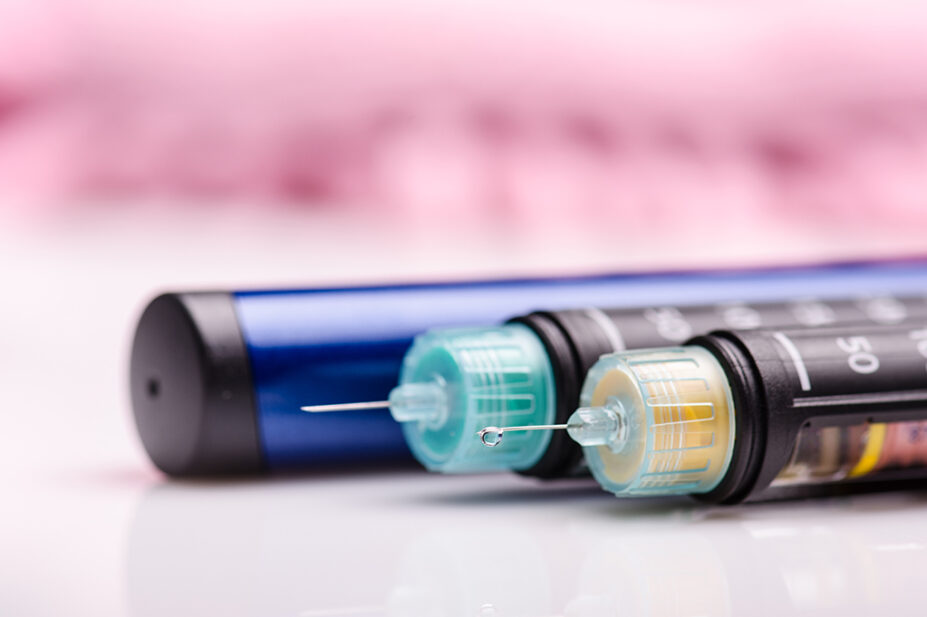
Shutterstock.com
The Association of British Clinical Diabetologists and the Primary Care Diabetes Society has updated guidance on the prescribing and treatment for type 2 diabetes mellitus (T2DM) while glucagon-like peptide-1 receptor agonists (GLP-1 RAs) shortages persist.
The updated guidance, published on 18 March 2024, said it “aims to support clinicians in selecting alternative glucose lowering therapies when GLP-1 RAs used in the management of T2DM in adults are unavailable during this period of national shortage”.
The national shortage of GLP-1 RAs was first announced by the UK government in June 2023.
In January 2024, the Department of Health and Social Care (DHSC) warned that shortages of the products would continue, with supply not expected to return to normal until at least the end of the year.
However, a medicine supply notification issued by the DHSC on 18 March 2024 said that tirzepatide (Mounjaro; Eli Lilly) 2.5mg/0.6mL and 5mg/0.6mL solution for injection 2.4mL pre-filled pens (containing four doses) were available and could support both new patient initiations and any patients unable to obtain their existing GLP-1 RA therapy.
The notice added that semaglutide (Rybelsus; Novo Nordisk) 3.0mg, 7.0mg and 14.0mg tablets were also available and could support increased demand for both new patient initiations and any patients unable to obtain their existing GLP-1 RA therapy.
Shortages continue for semaglutide (Ozempic; Novo Nordisk) 0.25mg, 0.5mg and 1.0mg solution for injection in pre-filled pens; dulaglutide (Trulicity; Eli Lilly) 0.75mg, 1.5mg, 3.0mg and 4.5mg solution for injection in pre-filled pens; and liraglutide (Victoza; Novo Nordisk) 6mg/mL solution for injection in pre-filled pens, the notification said.
Philip Newland-Jones, consultant pharmacist in diabetes and endocrinology at University Hospital Southampton NHS Foundation Trust, who co-authored the updated guidance, told The Pharmaceutical Journal that it was “very good news for people with type 2 diabetes that we now have sufficient
supplies of Rybelsus and Mounjaro in the UK to enable the DHSC to update previous patient safety alerts, allowing use of these products for new initiations and for those unable to obtain their usual GLP-1 RA medication due to intermittent supply.”
“The supply issues are due to continue into late 2024, and therefore it is good to have these options available,” he added.
“Many of those that care for those with T2DM would not have yet come across one of these medicines, in particular Mounjaro, which is a first in class glucose‐dependent insulinotropic polypeptide/GLP-1 RA.”
Newland-Jones added that providing national guidance from two trusted specialist societies “avoided duplication within every integrated care board around the country and hugely reduces NHS staffing time spent on the same issue”.
When the DHSC first announced the national shortage of GLP-1 RAs in June 2023, it warned prescribers to only use the drugs for their licensed indication and to avoid initiating them for T2DM patients during the shortage.
A national patient safety alert followed in July 2023 that advised providers to proactively identify patients established on GLP-1 RAs and discuss stopping treatment if they had not achieved targets set out in National Institute for Health and Care Excellence (NICE) guidance.
In March 2023, NICE recommended NHS use of semaglutide injections (Wegovy; Novo Nordisk) for weight management for adults with a body mass index of at least 35 and one weight-related health condition, such as T2DM or hypertension.


